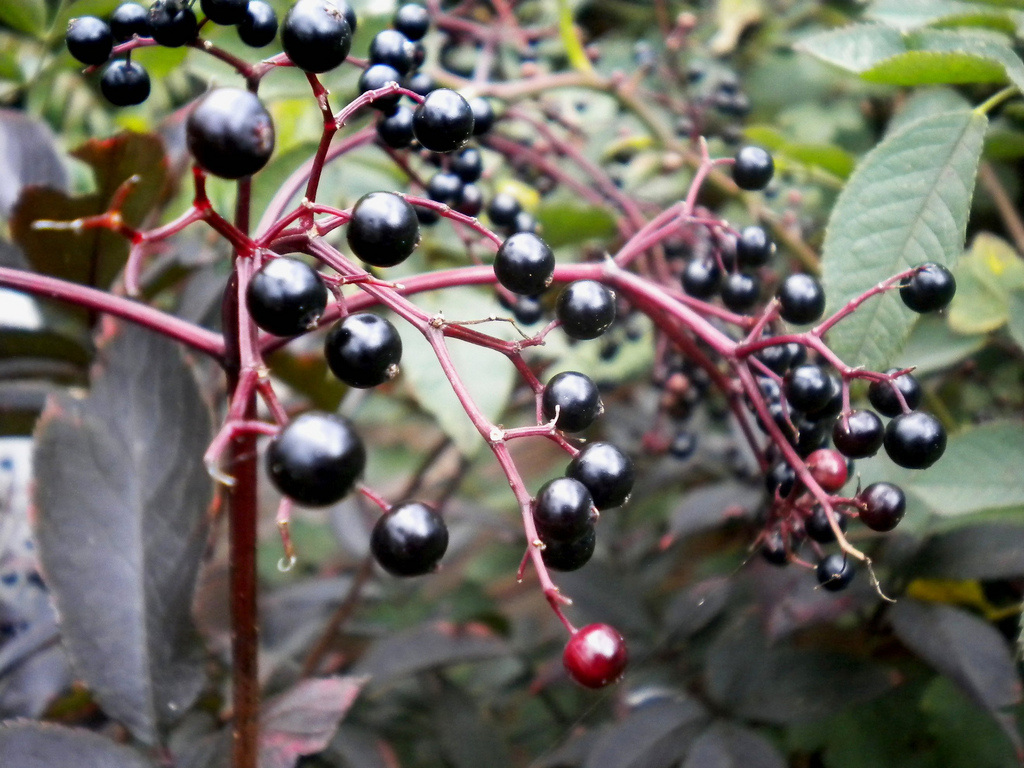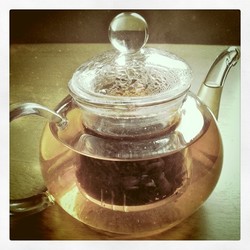|
Sickness Fighters
In the middle of summer, colds and flu are generally far from our minds, but this is a great time to stock up on bug fighters of all kinds. If you are fortunate enough to have an elder tree (Sambucus nigra) growing in your garden or your neighborhood, you have access to one of the most powerful antiviral medicines in the world. Dried elderberries are made commercially into teas and tinctures. The best and easiest way to harness their flu-fighting power is to juice them (then cook the juice before consuming). To make tasty elderberry pops, pick the elderberries at their ripest and rinse them in a colander. Put the clean berries in your blender, adding a bit of water, if needed, to get things going. Once you have the elderberry juice, put the juice in a nonreactive pot and cook it until it boils, then simmer for 15 minutes. Let the mixture cool, then fill ice cube trays about 3/4 full and freeze for an hour until firm enough to insert Popsicle sticks. Then let freeze until solid. If someone comes down with a summertime virus, have them suck on the deep red-purple pops and pretend they got them from the Good Humor man. The chill will feel good on scratchy throats, and the elderberry will go to work fighting the flu bugs. You can experiment with adding your children’s favorite juices to the elderberry juice before freezing. If a virus hits during the colder months, dissolve a couple of elderberry cubes in a cup of warm or hot water, and sip the elixir to banish the bugs from your immune system. Keep in mind that elderberries are antiviral and not antibacterial, which means they work great for flus and anything else caused by a virus but are ineffective at combating ailments caused by bacteria.
0 Comments
A Fresh Cup of Tea
Nothing could be simpler or provide you with more instant gratification than tea made with fresh herbs from the garden. There’s something tremendously satisfying about going into the garden and tearing off a few leaves here, a few flowers there, pouring some boiling water over them, and sitting down for a cup of freshly harvested tea in the middle of the afternoon. According to Richo Cech, author of Making Plant Medicine (Horizon Herbs, 2000), the plants most appropriate for fresh infusions are angelica, calendula, catnip, dandelion, gentian, horehound, lemon balm, lovage, plantain, self-heal and thyme. This is not to say you can’t experiment with making fresh infusions of other herbs, though. Along the way, you’ll find that fresh herbs impart a far more glorious color to water than their dried counterparts. As a general rule, the medicinal properties in dried herbs are more accessible for extraction than in fresh herbs because the process of dehydration causes the cell walls to become more fragile and to give up their contents more readily. For this reason, it will be necessary to use a larger quantity of the fresh plant when making tea than you would of the same plant in dried form. So for fresh herb tea, it’s best to finely chop or tear the plant (some people prefer the mortar and pestle route) and loosely pack it in a glass jar. Cover with boiling water and a lid (to prevent volatile oils from escaping) and steep until it has cooled enough to drink, about 20 minutes. Strain the infusion into a glass or drink it straight from the jar. You might try this method with a mixture of mint, lemon balm and catnip for a refreshing, calming tea. |
AuthorNaturopathic Lifestyle Educator and Wellness Coach, Sonja Upham, received medical missionary training and lifestyle education at Uchee Pines Lifestyle Center in Alabama and Hallelujah Acres in North Carolina. She moved from her position as Webmaster and class lecturer at Uchee Pines back to North Carolina where she serves as Assistant Health Ministries Director at her local church, and Co-founder of HeavenScent Wholistic Health, along with her husband Dave. Furthering her education she attended Global College of Natural Medicine, receiving her Master Herbalist and Holistic Health Practitioner certifications. She is currently working towards her doctorate in Naturopathy. Archives
October 2016
Categories
All
|
DIY Natural Health Solutions
Photos used under Creative Commons from steve p2008, Neeta Lind



